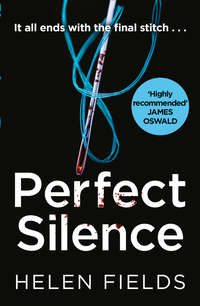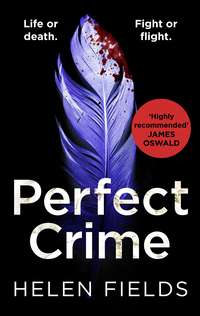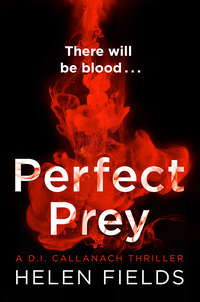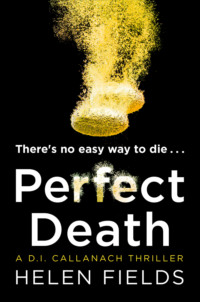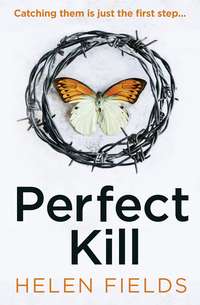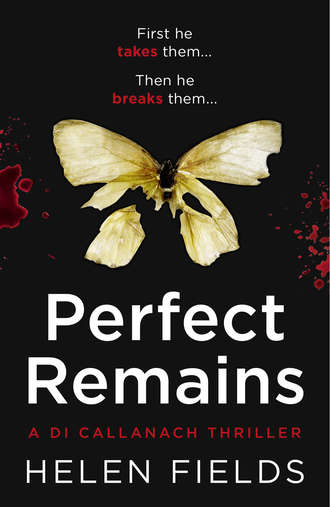
Полная версия
Perfect Remains: A gripping thriller that will leave you breathless
‘Sit down, please, Dr King. It’s good that you’re back at work. I’d like you to arrange a speaker for the next evening lecture. It’s only two weeks away so we’re behind with the arrangements. Can you organise it in that time frame?’ She raised her eyebrows at him. There had been a time when he’d loved that expression, her pensiveness. He’d been wrong. It was irritating. He hadn’t noticed then how it created tiny frown wrinkles across her brow, or her patronising habit of tipping her head to the side as she waited for a response.
‘Easily,’ was his reply.
She breathed in as if about to say something more, changed her mind and flipped her diary shut.
‘All right. The speaker should address one of our listed titles for the term and we’ll need an outline of their lecture seven days beforehand, so time’s tight.’
‘I know the format,’ he said, enjoying her tension. She had her arms crossed defensively over her chest. Little did she know how appropriate it was, he thought. If she could only see what he’d done; all that he’d become. The tailored suits and high heels, her immaculate hair kept short and businesslike, wouldn’t be so intimidating on his home territory.
‘Right, you’ll have a lot to catch up on from your leave, so that’ll be all.’ She turned her face to the computer monitor. He had been dismissed. All she’d ever done was dismiss him. King had once put forward a paper he’d spent months researching and writing, offering it for inclusion in the department’s journal, only to have it rejected out of hand. Three times he’d applied for academic posts in the department. Twice he’d been discounted at the first stage. The third time, he’d been selected for interview. He remembered his elation upon receiving the notification letter with something close to shame. He’d worked hour after hour, consuming every volume on philosophy he could find, studying teaching plans, the history of the department, everything and anything that would impress the board. He was finally going to receive the recognition he was owed. He wouldn’t let himself down.
On the day of his interview, he’d been calming his nerves in the gents’ toilets, splashing cold water on his face. That was when he’d heard those imbeciles giggling together, thinking they couldn’t be overheard in the ladies’ next door.
‘What are they doing interviewing him? He gives me the creeps and he’s horrible to the students, won’t give them the time of day. Can you imagine him teaching? I’m not staying here if he’s on the faculty, doing his typing, organising his diary. He’ll probably make us all address him as sir,’ the ugly bleached-blonde receptionist had said. He’d always loathed her. She embodied the worst of young women, concerned only with their grooming and social lives, handing themselves out to the lowest bidder, couldn’t write a sentence without a spelling mistake.
‘He’ll probably make us curtsy when we go in his room,’ said another. This was an older voice. Deirdre, King thought. That was worse. She’d always been polite to his face, friendly, even. How quickly women betrayed. Throwing a paper towel in the bin he told himself to stop listening, knowing it was stupid, damaging his confidence before the most important thirty minutes of his life and a chance at the academic career he’d always desired. But he’d stayed. It was the human condition: the need to know the worst, the destructive desire to see how it feels when you hit rock bottom. He’d inched closer to the wall to hear better. The voices were hushed and he’d held his breath to catch the words.
‘I shouldn’t worry about it,’ two-faced Deirdre had hissed. ‘Natasha didn’t even want to interview him but Human Resources told her she should. They didn’t want a challenge to the fairness of their long-listing process. His CV is quite impressive.’
‘How do you know so much?’ Bleached-blonde had sounded amazed. ‘Oh my God, I never hear this stuff.’
‘I had to type up the notes of her session with HR. Professor Forge called me in especially to tell me I wasn’t to say anything to anyone, so don’t you go blabbing. I think he makes her skin crawl like he does everyone’s. She’s not giving him the job, that’s for sure.’
‘Bloody right,’ the yellow-haired whore had replied.
King hadn’t moved, not until they’d finished tarting themselves up and he’d heard the ladies’ door swing shut behind them, giggling viciously as they’d trotted up the corridor. When their grotesque laughter had finally faded, he’d let rage take him, slamming a fist into the mirror that was reflecting his reddened face and swelling tears. A second time, then a third, he punched the shattered glass, no pain transferring from hand to brain because everything was black and buzzing and he wasn’t sure what he was doing there, why he’d come, only that he had to get out, get out, get out!
He’d grabbed a toilet roll and wrapped the paper around his hand until the bleeding was hidden, shoved the fist into his pocket, wiped the sweat and other unthinkable liquids from his face, and marched down the corridor. He’d forced his pace to slow, held his head high, put his dignity back on like a helmet and left the building. He couldn’t remember the drive home, nor unlocking his door and throwing all his notes, all that work, into the bin. He didn’t remember cleaning and binding the fist that really required hospital treatment but that still, in spite of all the abuse it had taken, he could not feel. Nor could he recall falling asleep on his bedroom floor, flat on his back, arms over his face as if blocking out the world that had insulted him so badly, the same room where his mother had spent hours patiently teaching him and his sister algebra, French, chemistry, anything and everything. A whole history in this house. He’d wanted his parents to be proud of him then. Had been sure that even in death, this new career path would make them proud of him now. But he’d been tricked. Lied to. Made a fool. What he did remember, with startling clarity, was waking up and knowing he was better than all of them. He would show them how superior he was, humble every one of them with his brilliance. He would not run, wouldn’t be forced out, would never let them know the humiliation he’d suffered. Reginald King was a man born for recognition, adoration even, and he would not quit until he had conquered.
He smiled at the memory. What a moment that had been, a pivotal instant in his life. Still, there was work to do before he could progress further. Work that paid for him to live. He couldn’t afford to slack. There were mouths to feed. He filed a faked doctor’s letter with Human Resources, citing chronic gastroenteritis as his illness then fired off a few emails searching for a speaker. He was particularly keen to secure the attendance of a representative from Professionals Against Abortion. That would get right under Natasha’s skin, women’s rights being her regular ride of a high horse. It seemed unlikely that they’d be overwhelmed with invitations to speak at such a prestigious institution as the University of Edinburgh. He would follow up his email with a phone call to them in a couple of days.
The rest of the afternoon was spent clearing his desk of trivia before a trip to the supermarket on his way home. There were certain women’s supplies that needed buying. Not a chore he looked forward to, but a necessity. He went through the self-service checkout to avoid a nosy employee thinking too hard about the contents of his basket, treated himself to a good bottle of white wine – he might even share a glass with the ladies if they were behaving themselves – and set off to prepare dinner for them. It would be an interesting evening, he thought. Time for them all to get to know each other better.
Chapter Eleven
At Ava’s suggestion they were meeting at a pub in York Place, just around the corner from Callanach’s apartment. She’d refused to give him the name of it, telling him he’d know it when he saw it.
She was right. Callanach spotted the Conan Doyle at the top of the road and knew immediately he was in the right place. Ava had promised to take him somewhere none of the rest of the squad would go, gossip was a price neither wanted to pay for a quick drink. It was warm and welcoming, eschewing the pretentiousness of trendy wine bars in favour of cosy chairs and a relaxed atmosphere. DI Turner was already there, checking emails on her phone and hugging a glass.
‘Can I get you anything?’ Callanach asked.
She smiled. ‘No, sit down and let me get you a drink. I started early, didn’t expect to find a parking space so easily.’
‘What’s that you’re drinking?’
Ava held up the glass mug and he caught the scent of apples and spice in its steam. ‘Mulled cider,’ she said. ‘I can never resist it. I’m guessing I can’t tempt you to join me?’
‘Glass of red, I think,’ he said. While she went to the bar, he held her glass in his hands, enjoying the heat of it as he inspected the place. A large painting of Sherlock Holmes’ creator hung above the stairs from the doorway. Callanach wondered what the writer’s personal demons had been, to have conceived such an eccentric hero.
‘You’re a fan?’ Ava asked as she handed over a large Cabernet Shiraz.
‘When I was young, I consumed his work. It all fed subconsciously into my decision to become a police detective, I suppose. You?’
‘I should read, I know, but by the end of the day I’m so drained that concentrating on a book feels like more work. I love the cinema. I go all the time, often to the midnight showings, sit on my own, eat popcorn. It helps me switch off.’
Callanach raised his glass and Ava met it with hers. They sat in silence and sipped until a barman appeared, placing menus casually on their table.
‘You said you wanted to talk about your case,’ Ava said. ‘Anything specific?’
‘Not really. I keep wondering why we’re not making progress, if it’s my fault. Maybe the move to Scotland has distracted me. If I’d found Elaine Buxton’s killer, Jayne Magee would be safely at home tonight.’
‘You don’t know for sure that the same person took them both,’ she said.
‘There are too many similarities for it to be a coincidence. I studied their profiles today. Excelled at school, both graduated with a first-class degree, each highly regarded in their own profession, hard-working, dedicated. And both disappeared from their home without a trace.’
Ava put her drink down. ‘You must have overseen cases at Interpol where there was no break for ages then something happened and one piece of the puzzle landed so you could see the whole picture. You aren’t responsible for a lack of progress if there’s nothing to find yet.’
‘Isn’t it our job to seek out the answers rather than waiting for solutions to come to us?’ Ava seemed content not to answer. Callanach realised the pomposity of his response to what had been a simple attempt at comfort, and opted for changing the subject. ‘Why did you become a police officer?’
‘My great aunt was poisoned when I was five, my inheritance stolen and I vowed to find the killer,’ she said.
‘Je suis désolé, I’m so sorry, I had no idea …’ Callanach spluttered.
Ava began to laugh, tried to control it then the giggles got the better of her.
‘I can’t believe you fell for that,’ she choked, the laughter starting again and Callanach sat with raised eyebrows as he waited for her to stop. ‘Policing felt like a good match for the person I was in my early twenties. And I probably wanted to make it clear to my parents that I had no desire to get married and have endless dinner parties until I popped out a couple of grandchildren for them. If I had my time again, I’m not sure I’d choose the same path. What about you? It was a dramatic move to leave Interpol and join a city police force. I’m guessing we’re not quite as glamorous as your French colleagues.’
‘Glamour is overrated,’ he said, finishing his drink. ‘I’m hungry. How’s the food here?’
‘The steak is excellent,’ Ava said. ‘As is the baked brie, which is what I’m having.’
Callanach couldn’t help but smile. It was an unfamiliar sensation. But Ava Turner was so open and upfront that it was completely disarming. They ordered and made small talk until the food arrived.
‘Come on then, everyone has a reason. Why the police?’ Ava asked as she dipped baguette in melted cheese.
Callanach instantly regretted having asked Ava such a personal question. He should have foreseen having to respond in kind. His pause was long enough that Ava had fully gauged his reticence before he met her eyes again.
‘You don’t have to answer. It’s not a trick. And tell me if I’m misreading this or being dense, but this is the way it usually works. You ask me a question, I ask you one. We bump into each other at work, we get to know each other better so there’s more trust. When we have a bad day, we smile at one another, remind ourselves that it’s all par for the course.’
‘I know how it works,’ Callanach said. It came out more brusquely than he’d intended and he regretted it immediately. This wasn’t how he’d wanted the evening to go. He readied himself to say sorry.
‘Don’t,’ Ava said. ‘Don’t apologise again. People are who they are. As far as I’m concerned, forcing a square peg into a round hole is a waste of energy. But you’ll have to find a better means of communication than this. Your squad doesn’t have to like you, but they do have to respect you. So here’s the thing. If you don’t say please or thank you to your detectives, they’ll still do what they’re told but they won’t feel a sense of pleasure in working their hardest for you. If you snap at everyone all the time, you’ll drag your team down. And if you don’t let anyone get to know you, whether it’s me or anyone else, then you’ve got no reason to be here because there’ll be no loyalty and no community. And that’s all you have in the police. It’s what grounds you and supports you. It’s the only thing that makes the job tolerable at the end of the day. Feel free to stop me when you want to explain that you already know all of this.’
Ava stood up, picked up her bag and strode away. Callanach realised she’d left her jacket, grabbed it and turned to call after her. He searched the small passageway of steps leading down to the exit but she had already disappeared. Letting out a stream of expletives he returned to the table, threw the jacket back onto her chair and put his head in his hands. He never used to be this person. On top of everything he’d lost – his home, his career, even his mother – he’d become someone he no longer liked. Perhaps Scotland was a mistake, perhaps he was wrong thinking he could take up policing in a new country and that it would be the way it was before. If he was going to run, he should have run much further and never looked back. Slipping on his jacket, he stood up to leave as a glass of wine was thrust into his hand. He stared at Ava.
‘Going somewhere?’ she asked.
‘I assumed you’d …’ he stuttered, trying to stop the words before he looked even more foolish than he already did.
‘That I’d what? Oh my God, you thought I’d left?’ Ava laughed, a big belly laugh that contained not the slightest hint of malice or mean spiritedness. Callanach glanced at the large glass of red in his hand and wished furiously for a time machine to start the evening again. ‘You can go if you like, but I’m off duty and I have no intention of ruining my evening by flouncing off anywhere. I went to the bar, as you can see. Thought I’d give you a moment to decide if you wanted to join in the conversation or just carry on sitting there like a lemon.’
‘Un citron?’ Callanach’s translation skills weren’t bad but that phrase made no sense at all.
Ava laughed again, more softly this time. Callanach gave up, took a long sip of wine and forced himself to sit back and at least pretend to relax. Perhaps that was what was required to start a new life. Perhaps the best he could do was pretend that he could still act normally around people. Maybe in time he’d get more convincing at it. He took a breath and forced himself to share the sort of confidences he once wouldn’t have thought twice about.
‘We lived in Scotland until my father died. I was four years old. After that my mother found it hard to cope, so we moved to France near her family. She had to work long hours to support us and I learned to fend for myself. I got tough very quickly, always fast with a smart mouth, getting in trouble, fighting with the local boys. To them I wasn’t properly French, didn’t fit in. I suppose I turned myself into the sort of arrogant jerk everyone assumed I was when they saw me. By university I was bedding any woman I wanted, partying constantly. My mother called them my dark years. I almost never went home, was egotistic and unlikeable. Then I met someone and it changed everything. For six months I managed to behave like a decent human being, my grades improved, I was content.’
‘You split up?’ Ava asked.
‘We had a petty row. I went out, got drunk and she found me later that night in her best friend’s bed. She left and did not return. I never saw her or spoke to her again.’
‘And that changed you forever into the much improved human you are today?’ Ava teased.
‘Unfortunately not. I was making extra cash modelling so I threw myself into that world, avoiding the university crowd. It was exploitative, drug-fuelled and toxic. Everyone was out for themselves. I spent my weekends travelling with a bunch of crazy thrill-seekers. If we weren’t drunk or high, we were skiing, scuba diving, sailing or skydiving.’
‘Sounds awful.’ Ava raised her eyebrows.
‘Everything was excessive which meant, after a while, that it all became commonplace. It’s one of the many things I regret – not being sober enough to appreciate how lucky I was. Then the bubble burst. I got arrested for drunk driving. The police officer was female. I was horribly rude about her looks when she was booking me in at the police station and she slapped my face, hard.’ He rubbed one hand across his cheek at the memory. ‘The officer changed her mind about arresting me. Instead, she put me in a car and drove me two hundred miles back to my mother where she made me stand and listen, sober by then, to the words I’d said to her. For the first time in years, I was truly ashamed. My mother cried with embarrassment. I was at a crossroads, and that police officer sent me the right way. Had it been anyone else who’d arrested me, I would not be here now.’
‘She’s the reason you joined up?’ Ava asked.
‘She was a part of it,’ he said. ‘It was simplistic, but at the time it made sense. I served in the French police force until I was thirty, then transferred to Interpol where I’ve been for the last five years.’
‘So what made you leave?’ Ava asked. Her phone buzzed and she paused to read a text, frowning fiercely and muttering under her breath.
‘What is it?’ he asked.
‘Another baby has been left in the same park, still alive and on its way to the hospital but the paramedics don’t expect it to survive. How can it be happening again? I’m sorry, Luc, I’ve got to go. I feel bad for leaving mid-conversation.’
‘Don’t,’ he replied, ‘at least I found somewhere that cooks steak properly.’
She smiled. ‘Nice to know what your priorities are.’ Ava put a companionable hand on his shoulder as she walked past him. He jerked away instantaneously, hoped she hadn’t felt it but saw the question in her face. ‘See you tomorrow, Luc. You take care.’
Ava left him staring at the books, globes and brass lamps adorning the walls. It was as good a place as any to drink wine and not think. He ordered another large glass of red and watched life go by until time was called.
The next day began too early. It was the first night he’d slept properly in weeks and the awakening beep of his phone was unwelcome. It was Tripp.
‘Not sure if it’s relevant, but I’ve been going through Jayne Magee’s neighbours’ statements. One of them saw a man at about the time we think she was taken, going round the corner at the end of the street pulling a large wheelie suitcase. I know it’s unlikely but …’
‘I’ll be half an hour,’ Callanach said.
He was there in twenty minutes, uncharacteristically dishevelled, shirt unironed, socks not even distantly related. Tripp stared as Callanach walked in clutching a steaming cup of coffee without noticing that a substantial amount of it was dripping down his jacket.
‘Morning, sir. Everything all right?’
‘Show me the statement and cross-reference it with a map.’
Tripp rummaged through a box of files then laid out documents on Callanach’s desk. ‘Jayne Magee’s house is here.’ He pointed at a red mark on a large scale map of the street. ‘And here,’ he pointed again, ‘about two hundred yards away, is where the neighbour saw the male. Mrs Yale who saw him was walking her dog, coming back into Ravelston Park as the male was exiting onto Ravelston Dykes. She didn’t see where he went after that. You think it’s our man?’
Callanach was silent. He started scrabbling through desk drawers.
‘Er … need any help, sir?’
‘No, I have it.’ Callanach held up a tape measure. ‘Lie down on the floor, on your side, tuck your legs and head in as tightly as you can.’
Tripp looked towards the doorway, mouth open, jiggling from one foot to the other.
‘Pour l’amour de Dieu, Tripp, I’m going to measure you, not kill you. Lie down.’
Tripp assumed the position and held still while Callanach stuck tape to the floor in a rough rectangle.
‘Move your feet in a bit,’ Callanach said. ‘And your elbows. Surely you can make yourself more compact than that!’
‘I can’t, if I move one limb another sticks out.’
‘C’est des conneries!’ Callanach muttered, throwing the measuring tape to the floor. ‘How tall is Jayne Magee?’
‘Five foot three,’ Tripp answered, giving up and rolling onto his back, arms outstretched as Callanach made for the door.
‘Salter!’ Callanach yelled towards the briefing room.
Footsteps approached at a pace and she burst through the door.
‘What, sir?’
‘Tripp will explain. We need to measure you.’ He threw the tape at them as he logged on to his computer. ‘Make yourself small, we must assume she was bound.’
They finished contorting, taping and measuring just as Callanach found what he’d been looking for on the internet. ‘The largest wheelie case available is thirty-four inches long. Is it feasible?’
‘Depends on the depth,’ Tripp said as Salter recovered. ‘But I’d say it’s possible.’
‘Salter, go to the shops,’ Callanach handed her a wad of notes, ‘and bring back a thirty-four-inch case, the deepest you can find, strong wheels. Tripp, we’re going to Ravelston Park.’
They got out of the squad car at the corner where the witness had spotted the male.
‘Two street lights, both the opposite side of the pavement from where he was walking,’ Callanach commented. ‘Many trees and high bushes. There would have been little light from the surrounding houses, they’re all situated well back from the road.’
‘He must have been turning west though, or he’d have crossed over before the corner,’ Tripp said. ‘So he either parked his car within walking distance from her house or he lives close by.’
‘He wouldn’t risk having witnesses to his route home,’ Callanach said. ‘There could easily have been more than one dog walker. The key to this is the vehicle. Have uniformed officers carry out door-to-doors within a quarter-mile radius, checking if anyone saw a man with a case getting into a car, van or truck. We should see if the witness walking the dog can tell us any more.’
Mrs Yale could be heard before she was seen, yelling at her husband to let Callanach and Tripp in, as she controlled an Airedale Terrier who appeared more hungry than friendly. She was large, in her late seventies and obviously excited by the attention.
‘Don’t mind Archie,’ she fluttered. ‘Sit yourselves down. Michael will fetch us tea, won’t you, dear?’ Her husband shuffled dutifully away.
‘Mrs Yale,’ Callanach began.
‘Isabel,’ she said. ‘Would you like biscuits with your tea?’


